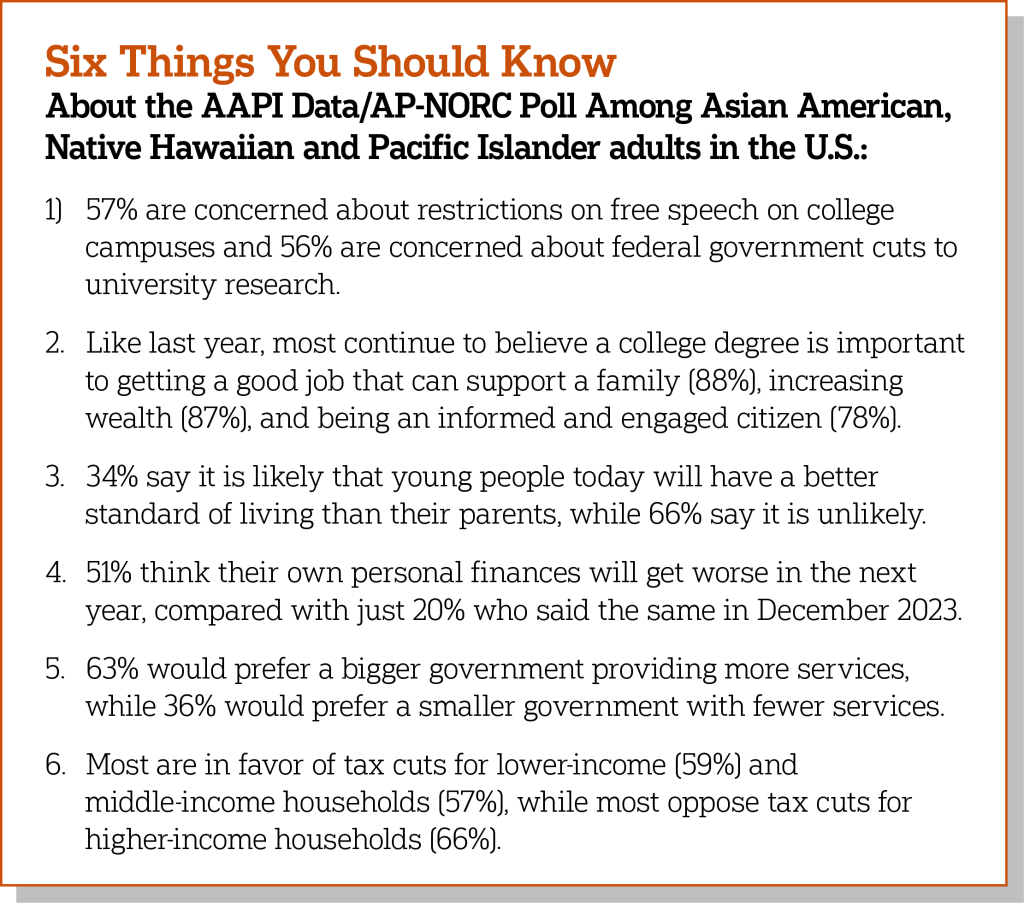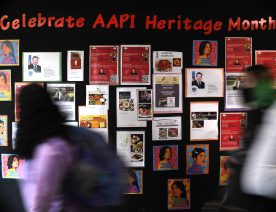
May 21, 2025
In the midst of ongoing economic uncertainty , a new AP-NORC/AAPI Data Poll finds few AAPI adults are optimistic about an improving standard of living for themselves or for future generations. Just 27% agree that people like them can improve their standard of living, and just 34% say it is likely that young people today will have a better standard of living than their parents.
AAPI adults continue to view a college degree as essential or important to improving their future prospects, including the ability to change jobs more easily in the long term (88%), getting a good job to support a family (88%), increasing wealth and minimizing debt (87%), or being an informed and engaged citizen (78%).
AAPI communities are concerned about many aspects of the higher education landscape. About 6 in 10 are concerned about increases in student loan debt (63%), restrictions to free speech on college campuses (57%), and federal government cuts to university research (56%). And most AAPI adults are opposed to proposals for cutting federal funding for campuses with DEI programs (65%) or arresting or deporting students involved with on-campus protests (62%). There is less opposition to cutting funding to universities accused of allowing antisemitic speech or for those allowing transgender athletes in women’s sports. Still, more AAPI adults oppose than support these policies.
Within the AAPI community, younger adults age 18 to 29 are more likely than those over the age of 30 to oppose certain federal actions on college campuses, including arresting or deporting students involved with on-campus protests and cutting federal funding to colleges and universities with DEI programs or that allow transgender athletes in women’s sports.
And when it comes to education in public K-12 schools, most AAPI adults are in favor of teaching about the history of AAPI communities in the U.S. (75%), the history of slavery, racism, and segregation (73%), and to a lesser degree, issues related to sex and sexuality (57%). Six in 10 oppose individual school boards restricting which subjects teachers and students can discuss in the classroom. These findings are nearly identical to those from a year ago.
Overall, AAPI adults are much more pessimistic about the state of the country and their own personal finances than they were a year and a half ago. About 7 in 10 think the way things are going in the country overall (73%) and the national economy (74%) will get worse in the next year, and 51% expect their own personal finances will get worse. In December 2023, about 4 in 10 thought the way things are going in the country overall and the national economy would get worse, and just 20% thought their personal finances would get worse.
Similar to 2023, only about a quarter of AAPI adults are very confident that they can keep up with their expenses (28%) or would be able to pay an unexpected medical expense (25%), and only 2 in 10 are confident they have enough savings for their retirement (20%), though many are somewhat confident. Confidence in being able to find a good job is down compared to 2023. Half of AAPI adults are not confident they could find another job these days compared with a third who felt that way a year ago.
AAPI adults are also concerned about the impacts that tariffs will have on the economy and their finances. Eighty-three percent say tariffs will hurt them and their family when it comes to the prices they pay, and 62% say tariffs will hurt job opportunities for U.S. workers.
The survey also reveals that 63% of AAPI adults would prefer a bigger government providing more services, while just 36% want a smaller government with fewer services. And about half say the government is spending too little on Medicare, Medicaid, and housing and food assistance for low-income people. However, many are skeptical that the government can spend taxes in the best interest of people like them. Just 5% are very confident in the federal government, 7% in their state government, 11% in their local government, and 14% in their local school district. Although confidence is low, AAPI adults are more likely to express being somewhat confident in their state and local government, as well as their local school district. About 4 in 10 say they are somewhat confident in each of these groups, compared with just 18% who say the same about the federal government.
Two-thirds agree that higher income households pay too little in federal taxes. Conversely, most agree middle-income households (63%) and their own household (57%) pay too much, and about half agree that lower-income households pay too much (48%). About 6 in 10 would favor tax cuts for lower-income and middle-income households, as well as small businesses, while two-thirds oppose tax cuts for higher-income households and large corporations.

The nationwide study was conducted by The AP-NORC Center for Public Affairs Research and AAPI Data from April 7–14, 2025, using the Amplify AAPI Monthly survey drawing from NORC’s Amplify AAPI® Panel designed to be representative of the U.S. Asian American, Native Hawaiian, and Pacific Islander household population. Online and telephone interviews were offered in English, the Chinese dialects of Mandarin and Cantonese, Vietnamese, and Korean with 1,094 Asian American, Native Hawaiian, and Pacific Islanders aged 18 and older living in the United States. The margin of sampling error is +/- 4.8 percentage points.






